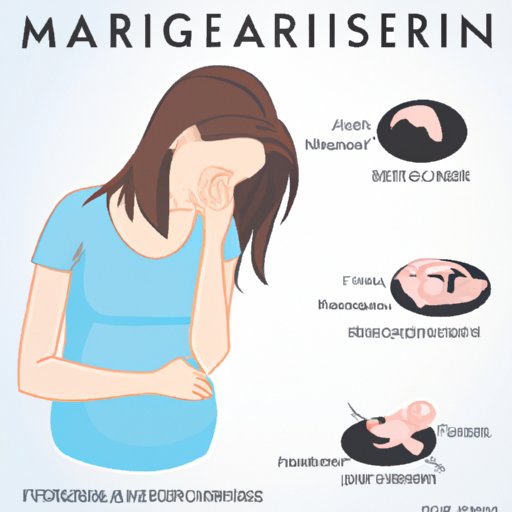Introduction
A miscarriage is the spontaneous loss of a pregnancy before the 20th week of gestation. It is estimated that up to 25% of all pregnancies end in miscarriage, making it one of the most common pregnancy complications. Understanding the causes, symptoms, and risk factors of miscarriage can help couples prepare for and cope with this difficult experience.
Causes & Risk Factors of Miscarriage
Miscarriages can be caused by a variety of factors, including age, hormonal imbalance, genetics, infections, and environmental factors. While some of these are out of a woman’s control, there are steps she can take to reduce her risk of having a miscarriage.
Age
Women over the age of 35 are at an increased risk of having a miscarriage. As women age, their eggs become less viable and the rate of chromosomal abnormalities increases. This increases the risk of genetic abnormalities that can lead to miscarriage.
Hormonal Imbalance
Hormonal imbalances can interfere with a woman’s ability to carry a pregnancy to term. If a woman has low progesterone levels, or if her body does not produce enough human chorionic gonadotropin (hCG), she may be more likely to miscarry.
Genetics
Genetic abnormalities are the most common cause of miscarriage. Chromosomal abnormalities, such as Down syndrome, can lead to miscarriage. In some cases, a woman may be born with a genetic disorder that makes her more likely to miscarry.
Infections
Infections, such as rubella, cytomegalovirus, and toxoplasmosis, can increase the risk of miscarriage. These infections can be contracted through contact with animals, food, or water. Women should take precautions to avoid exposure to these infections.
Environmental Factors
Certain environmental factors, such as smoking and exposure to chemicals, can increase the risk of miscarriage. Additionally, stress and fatigue can play a role in miscarriage. Women should try to maintain a healthy lifestyle to reduce their risk of miscarriage.
Symptoms & Warning Signs of Miscarriage
It is important to be aware of the warning signs of a miscarriage, so that medical attention can be sought promptly. The most common symptoms include vaginal bleeding, abdominal cramps, back pain, and loss of pregnancy symptoms.
Vaginal Bleeding
Vaginal bleeding is the most common symptom of a miscarriage. It is usually light or heavy spotting, but can sometimes be a heavier flow. The bleeding may be accompanied by clots or tissue.
Abdominal Cramps
Women who are miscarrying may experience cramping in the lower abdomen. The cramps may be mild or severe, and they may come and go. They may also be accompanied by pain in the lower back.
Back Pain
Back pain is another common symptom of a miscarriage. The pain may be intense and localized to one side of the abdomen. It may also radiate down the legs.
Loss of Pregnancy Symptoms
Some women may experience a sudden decrease in pregnancy symptoms, such as nausea and breast tenderness. This can be an indication of a miscarriage.

How to Reduce the Risk of Miscarriage
Women can take steps to reduce their risk of having a miscarriage. Eating a healthy diet and exercising regularly can help keep the body in balance. Avoiding alcohol, drugs, and smoking can also reduce the risk of miscarriage. Reducing stress and seeking medical care can also help.
How to Cope with a Miscarriage
Dealing with a miscarriage can be a difficult and emotional experience. It is important to acknowledge your feelings and seek professional help if necessary. Taking time to heal is also important. Support from family and friends can also make a difference.
When Do Most Miscarriages Occur?
Most miscarriages occur during the first 12 weeks of pregnancy. This is known as an early miscarriage. Late miscarriages, which occur between 13 and 20 weeks, are much less common. It is estimated that only 1-5% of miscarriages occur after 12 weeks.
What is the Difference Between a Miscarriage & Stillbirth?
A miscarriage is the spontaneous loss of a pregnancy before the 20th week of gestation. A stillbirth is the death of a fetus after 20 weeks of gestation. The causes of stillbirth can be similar to those of miscarriage, such as genetic abnormalities, infection, and environmental factors.
What are the Long-Term Effects of a Miscarriage?
The long-term effects of a miscarriage depend on the individual and the circumstances. Emotionally, a woman may experience grief, guilt, and depression. Physically, she may experience fatigue and difficulty conceiving in the future. It is important to seek professional help if needed.
Conclusion
Miscarriage is a common complication of pregnancy that can have long-lasting effects. Knowing the causes, symptoms, and risk factors of miscarriage can help women prepare for and cope with this difficult experience. With proper care and support, women can move forward and look towards the future.


